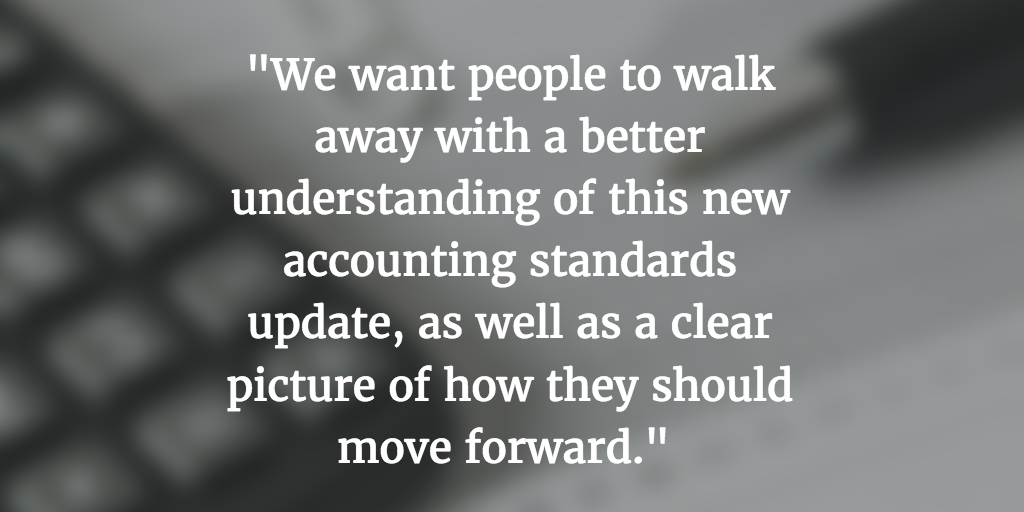John Alfonso is an accomplished CPA with over 30 years of experience providing audit, accounting, and consulting services to not-for-profit organizations. He works extensively with associations, community development corporations, educational institutions, private foundations, religious organizations, governmental entities, and social service agencies.
Based in New York, John is a partner in CohnReznick’s Not-for-Profit and Education Industry Practice, and is a speaker at this year’s Innovate Conference, hosted by JMT Consulting. His session will cover the new Accounting Standards Update (ASU 2016-14) for financial statements of not-for-profit organizations that affects all issuers, donors, grantors and creditors associated with them. We sat down with John before his session to learn more about what attendees can expect from his presentation.

One-on-One with John Alfonso
Q: Would you mind telling us a little bit about yourself to start?
A: I’ve been in the practice of public accounting for over 30 years and spent most of that time serving tax-exempt organizations. I’ve been a partner at CohnReznick for about 14 years, and I’m the New York office lead of the Not-for-Profit and Education Industry Practice. I also serve as treasurer of the board for the American Cancer Society, where I’ve volunteered for a number of years. I’m really privileged to be able work with so many talented people at both organizations.
Q: How are you getting your message out? Do you travel a lot?
A: I do a fair amount of traveling along the East Coast. But one very successful initiative that CohnReznick has increasingly embraced is conducting webinars. Rather than traveling to get on a podium, we can broadcast thought leadership to clients, friends, and contacts around the country through live webinars. The last couple of webinars we presented were on the new ASU, which I’ll be covering for Innovate this year. The interest we received far exceeded our expectations. It’s a complicated topic, and nonprofits are looking for guidance, which also makes it a highly coveted topic!
Q: In your words, what is the primary goal for your Innovate session?
A: The main objective is to educate attendees on this new guidance that has been promulgated by the Financial Accounting Standards Board (FASB). There are going to be significant implications for nonprofit organizations, as it is the first large-scale change within the financial reporting standards since roughly 1993.
Though it might be an exaggeration to call the ASU a complete makeover, it is a refresh of the financial reporting rules for all nonprofit organizations. I hope to create some awareness about these new rules, answer questions and share some best practices with the audience while hearing their thoughts on the changes. Through our live seminars and webinars, we’ve found that many organizations haven’t done the research yet to be fully prepared – and we want to help with that.
Q: Why should attendees join your session?
A: As I mentioned, we’ve found that many nonprofits aren’t yet prepared for the upcoming changes. I’m going to share with them CohnReznick’s recommendations on how to implement the new guidelines, what organizations can do now to ease implementation, and focus on how they can implement this new set of standards in an efficient, organized manner.
Q: When does the new ASU take effect?
A: The new rules go into place after December 25, 2017. So, depending upon your organization’s fiscal year, it could be in either 2017 or 2018. In either case, nonprofits need to act now.
Q: Who is affected most by the new ASU? Donors, grantors, or creditors?
A: It’s really all of the above. If you’re a reader of financial statements, you need to understand the new conventions. Another important group affected is the regulators – the largest of which being the IRS. If you’re the recipient of federal awards, funding sources are also going to need to understand what’s involved. In a nutshell, the changes affect anyone who is a user of a charity’s financial statements.
Q: What is the biggest financial management challenge you see nonprofits face?
A: In general, many nonprofits today are asked to deliver on their ever expanding missions with dwindling resources. It’s incumbent for nonprofits to increase efficiency in their operations, administration and overhead. We’re finding that many nonprofits are looking within to organize themselves in more effective and efficient ways. They’re upgrading technology and looking to reach a new, younger group of potential stakeholders who are more likely to engage over social media than in-person. That means charities have to be more innovative to realize efficiencies and reach new people.
Q: What do you hope the biggest takeaway is for attendees at your presentation?
A: We want people to walk away with a better understanding of this new accounting standards update, as well as a clear picture of how they should move forward.
Q: Do you have a quick financial management tip that nonprofits could benefit from when reading this post?
A: I would encourage readers to view the post on our website, which contains a lot of thought leadership on the topic that I’ll be covering at Innovate. Reading some information beforehand can help you prepare for the session so you can ask questions that will help your organization.
We’d like to thank John for taking the time to sit down with us and we hope to see you at Innovate 2017 this year!
Innovate is JMT’s Thought Leadership and Training Conference, specifically for nonprofits.
Visit CohnReznick’s ASU Portal for more details on the new guidance.
